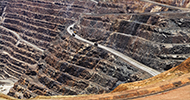With a constantly changing situation like the COVID-19 outbreak, it can be difficult to keep up with the latest statistics and recommendations. But Argentine officials have found a way to streamline the process of monitoring and sharing information about the virus, with some help from Hexagon’s Luciad platform.
A number of state and national agencies, including the Civil Protection Secretariat of the Ministry of Security, met to discuss best practices for consolidating and communicating updates about Coronavirus. The solution they arrived at was an application shared across agencies and built by Argentinian systems integrator Space Sur. It’s called the National System for Comprehensive Risk Management (SINAGIR).
LuciadLightspeed and LuciadFusion are the core of SINAGIR. Their ability to process and visualize massive volumes of geographical information gives users confidence that the decisions they make are based on a complete picture with no missing data. And Luciad’s high performance means that action can be swift and decisive.
Various government sources will provide and access the information in SINAGIR’s database, resulting in real-time visualization of how the virus is spreading. The digital map also highlights border crossings and specialized medical centers, so that officials can assess the situation and at the same time make plans for how to handle it.
Helping the People
SINAGIR is also a centralized mechanism for contact with citizens. Officials can share information and alerts on social media networks and via text message. If a particular “hot spot” on the map shows a higher than average number of new COVID-19 infections, for example, residents in that area could receive a message informing them of that fact and advising them to delay errands like grocery shopping until the spike subsides.
SINAGIR collects information about resources available — hospital beds, ambulances, doctors on call — so COVID-19 cases can be treated as quickly and efficiently as possible. And even after the COVID-19 pandemic has tapered off, SINAGIR can be used to track dengue, measles, and other serious contagious diseases.
In addition, SINAGIR allows authorities to collaboratively develop and manage risk maps, turn Big Data into dynamic 4D situational awareness, and perform automated analysis via satellite to provide early warnings of potential disasters, making it what one official called the most advanced risk management solution in Latin America.
Officials say the goal is for SINAGIR to reduce the time it takes to mitigate the effects of terrorist attacks, railway accidents, fires, and other calamities. The communication function, meanwhile, can be used to alert residents of the need to evacuate an area when natural disaster strikes, preventing loss of life.
Plans for the Future
The geospatial component of SINAGIR helps authorities provide assistance to those who are affected, and it also enables them to prepare for future events and make plans that avoid repeating mistakes. The capacity for an immediate, coordinated response means people and property will be better protected from the unexpected.
SINAGIR is staffed 24 hours a day, 365 days a year, with 12 people working at any given time. It was launched in the San Cristóbal neighborhood of Buenos Aires, with plans to expand throughout the country. Hopes are that data from civil organizations like volunteer firefighters and even from private sector businesses will eventually make SINAGIR even more robust.
Argentina’s example is an excellent argument for the importance of location intelligence. It empowers government officials to make informed decisions, with the goal of saving lives. Check out Hexagon’s dedicated COVID-19 page to see more ways that our technologies are being leveraged for good and learn about how we’re responding to the pandemic.















